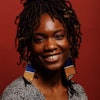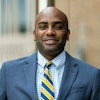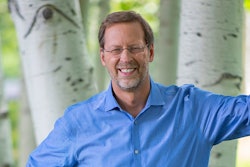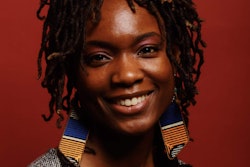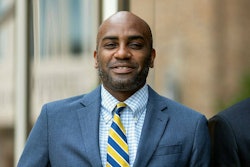In September 1986, then-Japanese
Prime Minister Yasuhiro Nakasone
shocked many Americans when he
asserted that America was
intellectually inferior to Japan
“because of a considerable number
of Blacks, Puerto Ricans and Mexicans.”
Dillard University President Dr.
Samuel DuBois Cook, with characteristic
practicality, decided that something should
he done to refute Nakasone’s racist
misconceptions.
Earlier that year Cook had traveled
to Japan for a university presidents
conference sponsored by the United
Methodist Church and Japanese universities,
the only Black university president
in the twenty-member group. There he had
been impressed with a Japanese academic, Dr.
Makoto Fujita, who had been speaking at
historically Black colleges and universities
since 1954 and had a profound understanding
of and appreciation for the Black American
experience.
“I was impressed by Dr. Makoto Fujita,
and we discussed the possibility of a
Japanese study program,” Cook later
explained.
Fujita proposed that Dillard host
Japanese junior high school students on the
campus for a three-week English program.
Cook implemented the proposal and in 1991,
Dillard began a Japanese language studies
program headed by Fujita.
“No other university is conducting such
intense study,” Fujita brags.
That kind of institutional and academic
bridge building between cultures is Cook’s
way of fighting the tragedy and tyranny of
racism.
“I’m against all forms of racism. I
believe we all belong to each other — Blacks,
whites, orientals. We need to understand each
other as members of the human family,” Cook says.
Cook applied that same combination to
the tensions between Blacks and Jews in the
United States. The first Dillard University
National Conference on Black-Jewish
Relations was held in 1989, and shortly
afterward the institution established its Center
for Black-Jewish Relations, the only center of
its kind in the world. Among other things, it
sponsors an annual conference that focuses on
the political, religious and even musical ties
between Jews and African Americans. “When
Blacks and Jews fight, God cries,” Cook has
been known to say.
“Dr. Cook vowed during the civil rights
movement, when the Black-Jewish coalition
started to fall apart in the 1970s, that
one day he would help put the coalition back
together,” said Alan Katz, head of the Center
for Black-Jewish Relations. “Dr. Cook feels
that Blacks and Jews have a history of
common oppression and they are allies.”
Remembering the alliance between Jews
and Blacks during the civil rights movement,
Cook says, “Every time we have a national
conference on Black-Jewish relations, I
want to see that spirit reestablished.”
Finding Inspiration
Cook grew up in Griffin, Georgia, one of
six children born to the late Rev. and Mrs.
M.E. Cook. Both his father and grandfather
were ministers, and Cook had planned to
follow in their footsteps. Attending Baptist
conventions, Cook became friends with
another minister’s son, Martin Luther King Jr.
“M.L. and I became friends in junior high
school,” Cook remembers.
At Morehouse College, they were part of
a special class of fifteen-year-olds recruised
during World War II, when most college-age
students were in the armed services. Other
members of their class included: the late
Robert Johnson, who was editor of Jet
magazine, and Vernon Jordan, who later
headed the National Urban League. Lerone
Bennett, who later edited Ebony magazine, was
in the following class. Morehouse College
President Dr. Benjamin E. Mays became a
surrogate father to Cook and the other
students.
“He just inspired all of us. He believed in
us,” Cook says. “And that’s the genius of our
colleges. We believe in our students. And
because Dr. Mays and others believed in us,
we didn’t have any better sense than to believe
in ourselves.”
Mays, who never had children, came to
regard Cook as a son. He visited the Cook
family every Thanksgiving until his death
in 1984. He asked Cook to write the
introductions to his autobiography, Born to
Rebel, and his last book, Quotable Quotes of
Benjamin Mays. He was Cook’s first
commencement speaker at Dillard and
received the institution’s first honorary
degree. Ten years prior to his death, Mays
asked Cook to deliver his eulogy.
“He used to tell us, `You’ll die unheralded,
unrecognized, but never sell your soul to
anybody…to anything. You have to stand by
your beliefs, stand by your selfhood, stand
by your ideals, though the heavens fall.’ A
man of integrity. That sums up his life,” Cook
said of his mentor.
After graduating from Morehouse, Cook
earned a master’s and doctorate in political
science from Ohio State University and did
post-doctoral studies in philosophy there,
while serving as a social science specialist
in the U.S. Army.
Cook’s career included teaching at
Southern University, At ante University,
Duke University, the University of Illinois
and the University of California at Los
Angeles. He has lectured at colleges and
universities nationwide, in Paris, in Vienna,
and in Bucharest. He was also a Rockefeller
Foundation Fellow and Ford Foundation
Faculty Research Fellow and is a member
of the Board of Trustees Emeritus of Duke
University. The recipient of more than fifty
awards, he has received recognition from the
Anti-Defamation League of B’nai B’rith
and the National Conference of Christian and
Jews.
He also was honored with The Dr.
Martin Luther King Jr. Drum Major for
Justice Award and the Duke University
Award for Distinguished Meritorious Service.
While professor and chair of the political
science department at Atlanta University
(from 1956 through 1966), Cook was heavily
involved in politics and civil rights, holding
town meetings to bring Blacks and whites
together.
“Sam connected Martin Luther King Jr.
with some members of the white community,
such as Ralph McGill, the publisher of The
Atlanta Constitution, and others,” said Cook’s
wife of thirty-seven years, Sylvia Fields
Cook. “I used to hear Martin Luther King Jr.
say, `Sam is my political advisor.'”
Cook was at Duke University, the
first Black professor to teach at any
predominantly white institution in the
South, when King was murdered in 1968.
Cook had planned to retire from his post
as Duke’s director of undergraduate studies in
political science and turned down several
offers to be president of Dillard University.
He changed his mind, however, during a
campus tour.
“I had a flashback to my days at
Morehouse,” recalled Cook. “I saw Dr. Mays,
in a hurry, going from his house to the office,
and I said if I could do one-twenty-fifth with
the students at Dillard that Dr. Mays did
with me and others, my life would have
meaning. I told Dr. Mays until the day he
died, `You tricked me.'”
Providing Inspiration
A private, historically Black university,
Dillard University was created in 1930, the
result of a merger between Straight College
— operated by the American Missionary
Association, the educational arm of the
Congregational Church — and New Orleans
University — operated by the Freedmen’s Aid
Society, the educational arm of the Methodist
Church. Located between a former cow
pasture and a graveyard, Dillard’s
self-contained campus now houses twenty
buildings, including the new Samuel DuBois
Cook Fine Arts and Communication Center.
It
offers thirty-nine academic programs
employing 115 full-time and twenty-three
part-time faculty members. Enrollment in
1996 was up to 1,600 students, with 239
degrees granted last year. Although 40 percent
of the student body is enrolled in liberal arts
programs, Dillard is also acclaimed for its
excellent business and science departments.
“I came here not to save Dillard, but to
make a great institution greater. That’s been
my challenge and my work all these years,”
Cook said.
During his tenure, Cook stressed fiscal
responsibility, academic excellence, and
higher educational standards. Dillard’s
endowment has increased from $5 million
in 1974 to more than $40 million today.
He revised curriculum, established the
Presidential Scholars and University
Scholars programs, upgraded admission
standards and raised academic
requirements for honors graduates
and honor roll students.
In assessing his presidency, New Orleans
Mayor Marc H. Morial said, “Dr. Samuel
DuBois Cook’s presidency has been
marked with a period of tremendous
growth in the areas of enrollment and
capital improvements at Dillard
University…. Dr. Cook will be
remembered as someone who made a
difference in the world of higher
education and the community.”
Cook views education as a privilege to
be earned. He raised academic standards
and demanded a 3.0 GPA or better from
those aspiring to campus leadership
positions. He also set higher standards for the
faculty. Teachers had to be role models and
mentors.
Clifford Johnson, vice president of
development at Dillard, said, “He’s very
demanding of himself and people around
him. So he set a performance level that is
very high.”
Dr. Charles Teamer, Dillard’s vice
president for fiscal affairs, says, “Dr. Cook
is a person who comes to work early, stays
late and believes that those associated
with him should do the same thing.”
However, he adds, “He will not ask you to
do more than he will do.”
Charles A. Ferguson, president of the
Dillard Board of Trustees, said, “The full
extent of Dr. Cook’s contribution cannot be
measured in terms of academic excellence
and financial health alone…. The true measure
of Dr. Cook’s achievements will be seen in
years to come as more and more Dillard
graduates, inspired by his example, assume
important positions in this community, this
state, and this nation.”
According to Dillard graduate Glyniss M.
Johnson, now art director at the prestigious
BBDO Advertising Agency in New York,
“President Cook and others insured that my
classmates and I received a well-rounded
education.”
Jacqueline Francis, a careers advisor
in Birmingham, England, agreed: “My degree
from Dillard prepared me to compete on both
continents. It also taught me the importance
of making a contribution to the betterment of
the human condition.”
“Dr. Cook stressed academic excellence,
which is the fuel needed to do
whatever you want to do in life. We
thank him for that, said Dr. Rodrick A.
Stevenson, the chief of hepatobiliary and
transplantation surgery at Meharry
Medical College in Tennessee.
A Pen in His Future
In announcing his retirement,
effective June 30, 1997, Cook said, “I am
under no pressure to retire except for the
inner prompting and inward impulses of
my own selfhood and journey. Dillard is
academically sound as well as financially
strong. I am in excellent health today, but
it is time for new, younger, and more
vigorous leadership.
After moving back to Atlanta, Cook
plans to finish several books he started
before arriving at Dillard. He will finish a
book of essays covering a variety of
subjects, including: political philosophy.
coercion and social justice, democracy and
tyranny, and Christianity and democracy.
One of these days when I get the
nerve, I’m going to do a collective
autobiography,” he says. The book will
be about the people who influenced and
enriched his life: Dr. Mays, Howard
Thurman, Dr. King, Lerone Bennett,
Vernon Jordan, Ralph McGill. Robert
Johnson, and others.
“As I look at my own life and see it
pass in review,” said Cook. “it’s what
Benjamin E. Mays and…others in our
lives taught us what we could become:
We could really be somebody if we really
put our hearts and mind to work on it.”
COPYRIGHT 1997 Cox, Matthews & Associates
© Copyright 2005 by DiverseEducation.com


